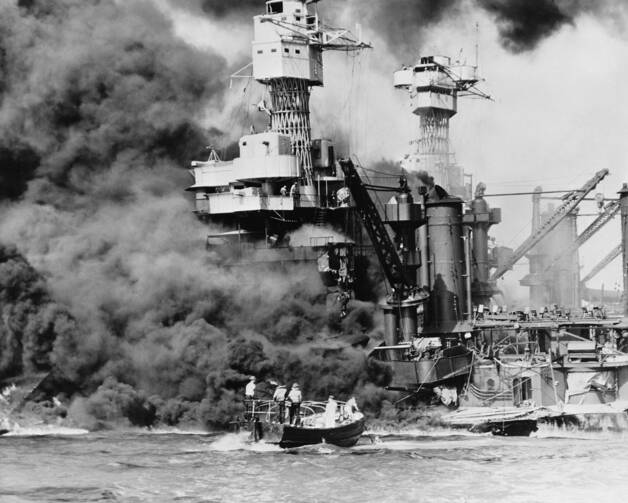Japan declared war on the United States and Great Britain, as of dawn, December 7. On that day, Sunday, Japanese dive-bombers and naval craft, without warning, attacked Pearl Harbor Naval Base and Hickam Field, Hawaii, and other American possessions in the Pacific. That same day, in Washington, at the same time as the assault, Ambassador Nomura and Special Envoy Kurusu were delivering in person to Cordell Hull, Secretary of State, the rejection by the Japanese Government of the American demands....
At once, following the Japanese assault, the American fleet in the Pacific, and the American air force went into action against the Japanese aggressors. On Monday, December 8, one half hour after high noon, the President of the United States addressed a joint session of Congress. His address lasted little more than five minutes. After enumerating the series of attacks made by Japanese war forces on American possessions during the past forty-eight hours, he declared very plainly, that he asked that Congress declare that a state of war has existed since December 7, between the United States and Japan. Such are the facts in the final stages of the war with Japan that has, through long years, and in the past month, been regarded as inevitable.
This is not the day of exultation. It is the day of tragedy.
The United States has been left no choice but to prosecute war against Japan with the full power of naval, air and army forces. Attacks such as those reported in the Pacific can be answered in one way only, by the complete defeat of the Govemment and war-forces that perpetrated them, prior to a war declaration and while diplomatic negotiations were still being transacted. That Japan, as it has protested during these Washington negotiations, believed that its very existence was imperilled by the American demands, is not now the point, in view of the naval and air assault on American objectives.
That the United States had used economic warfare to subdue Japan and to make Japan conform to the American defense program is no longer an immediate subject for debate, now that Japan has attempted to destroy American air and naval bases. Whatever the foreign policy of the Administration has been in regard to war with Japan is a matter for the future historians of our times. The hard and uncompromising fact exists that Japan has, by an overt act of aggression, attacked American possessions and ships in the Pacific and has declared war on the United States. There is but one answer, however much we may deplore the curse of war and American entry into war. By the vote of our duly elected Representatives in Congress, and with the support of the people they represent, the United States is determined to wage war upon Japan.
Our government calls upon the people to unite in the prosecution of this war, and to reaffirm, in practical terms, their loyalty to their nation. Every American will respond, and will perform his duty in this crisis and in the war years that follow. With leaden hearts, however, and with saddened minds they foresee the dreary and dangerous days that are to come. They did not want war with any nation; they feared that they would eventually be engaged in war; they protested against war. Perhaps, in Japan, the common people likewise hated war and longed to be free of war. But their leaders provoked war, and they were the victims. Here, the people also must suffer and sacrifice, now that war has been thrust upon us. This is not the day of exultation. It is the day of tragedy. But the American people must and will meet that tragedy and emerge from it triumphant, both in the war in the Orient and in the closely following war against the Nazis.








